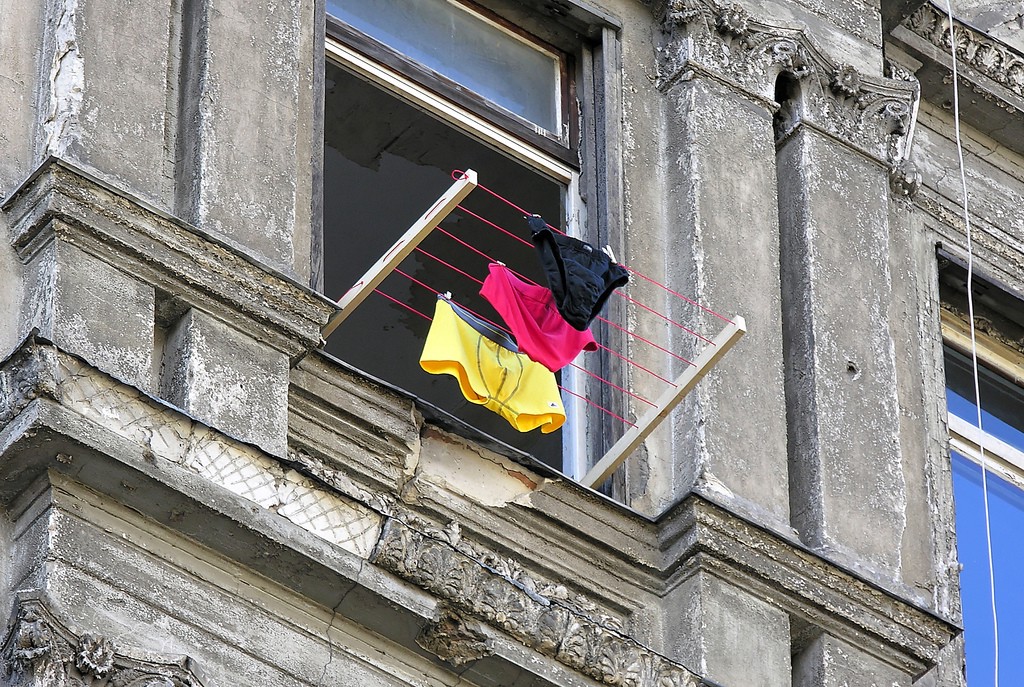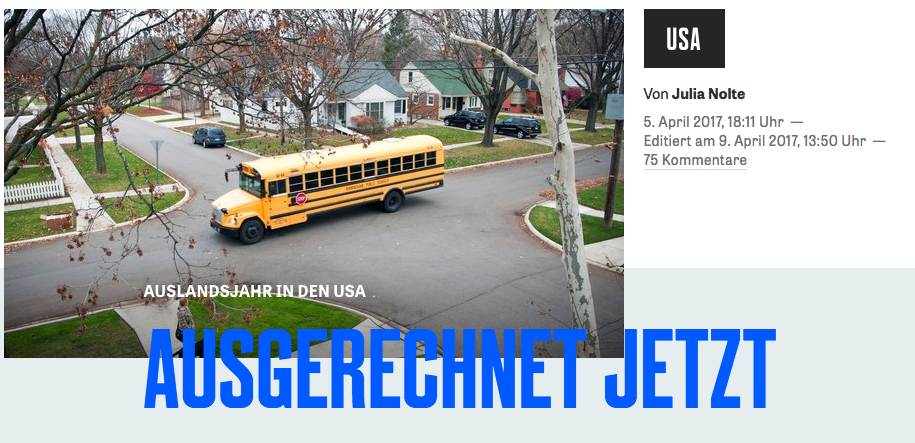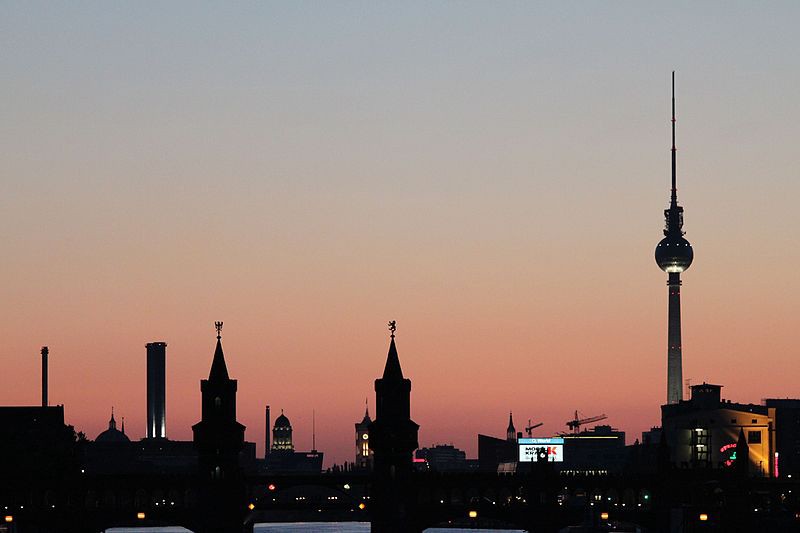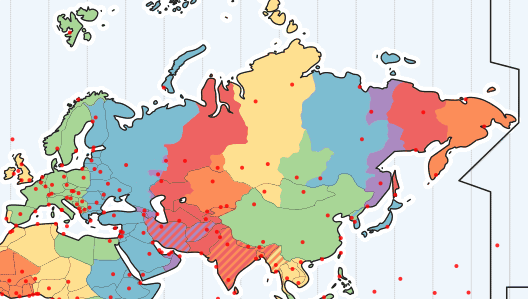Someone Please Rescue These Poor German Exchange Students Living With Republicans
Deutschland über us (and in us)

It was bad enough to be an American watching as the leader of the free world got snubbed by Donald Trump a few endless weeks ago.
No shake: Donald Trump snubs Angela Merkel during photo op – video
Now, imagine watching that whole debacle play out as a German 17-year-old trapped in America, surrounded by bigots and guns. That’s what’s happening to some of the German Austauschstudenten (OWS-towsh-stoo-DEN-ten), or exchange students, featured in this fascinating piece in Die Zeit, who probably thought they were in for a year of laughably facile academics, cupcakes for breakfast and guaranteed prom-night action* when they signed up for an exchange program to the U.S. of A.
What they’re getting instead is a heavily air-conditioned seat in the VIP box of the apocalypse — and they’ve kindly provided the Volk back home with a glimpse. Remember “If It Happened There,” the bygone feature on Slate where Joshua Keating wrote about America like America writes about unstable war-torn fer’ners? Well, now there is here, and these marooned German teens are writing home about it.

The headline translates as “Exchange Year in the USA: NOW, OF ALL TIMES,” and it introduces the accounts of four students’ sometimes-surreal experiences as Germans accidentally adrift in Trump’s America. Jette (YET-uh), for example, a 17-year-old from Buchholz (a small town in northern Germany), describes a tense showdown with her Fox-News-watching, Target-forbidding Indiana host mom, who I am guessing was not aware of Germans’ blatant disbelief that Certain Topics are Not Fit for Polite Company when she agreed to take in an Teutonic teen who made this happen, God bless her opinionated German ass:
One time I had a big fight with my host mother, during which she really screamed her head off. I just wanted to know why they, ostensibly devout Christians, didn’t want to take in refugees. I explained to her that in Germany, I had contact with refugees through my church and got along with them great. [My host parents] asked, Weren’t you scared?
Then there’s Fietje (FEET-yeh), from Jühnsdorf, a 300-person village (which Germans charmingly, without fail, always pronounce WILL-age) in the Brandenburg region, who some sadistic bastard decided to plunk down in the middle of Idaho, and who says he sat in front of the TV alone for ten hours on election night. (That’s more intestinal fortitude than I, Fietje; the Schuman household shut off all devices at 9:30 p.m., and curled up in the collective fetal position trying not to throw up our election-night pizza.)

Granted, Fietje’s host family is “very chill,” and he “totally like[s] them a lot,” possibly because they are what Germans call religionslos (RAY-lee-gee-OWNS-lows), a non-confrontational word for “atheist,” since nobody really uses der Atheist, because according to my German friend Rica, that word contains nasty judgmental connotations against atheists! And an entire nation of people care about atheists’ feelings! WHAT?
Anyway, despite having plenty of chill, Fietje’s religion-less host dad also owns some 40 guns, which his host mom, despite being “against that,” trusts him to use correctly. “What’s dangerous,” he adds, is “the widely pervasive ignorance of anything that happens outside the US.” I’ve slanted that translation a bit; the word Fietje uses for “ignorance” is Halbwissen (HALP-viss-un), which literally means “half-knowledge,” which is the perfect way to describe classmates who ask him if Berlin is in Russia.

Over in Middle America, Nico (NEE-koh), a 17-year-old from Hamm (a small town in the Ruhrgebiet, or industrial corridor), seems to have lucked out with his family in suburban Detroit. (Also, why is it that the Germans sent someone from a teensy village to basically unpopulated Idaho, and someone from the Ruhr to what was once American’s industrial corridor? Like, do they really think Germans can’t function outside of their familiar surroundings?) Anyway, Nico’s liberal host parents are “just as interested in politics as I am,” and the whole family went out for feelings-eating ice cream after the election.
And finally there’s Pauline (pow-LEEN-uh), a 16-year-old from Hamburg on exchange in Forest Grove, in my home state of Oregon, where, she says, some 50 percent of her high school classmates are of Mexican heritage. She says the election didn’t seem real to her because the distance between the American West Coast and the East Coast (“where Trump lives”) is so vast that it spans three time zones. (For comparison, all of Central Europe is in the same time zone. Also, I just found out Russia has nine time zones, which I find abjectly terrifying.)

Anyway, Pauline says all that changed on a day in February, “when the people from Immigration Control [ICE] came to Forest Grove looking for illegal immigrants. Then, suddenly, there were clearly fewer people showing up to school.”
In some cases, it appears that these cool teens are substantially more intelligent than the host families who have taken them in. This is not surprising to anyone familiar with the German school system, which tracks students around the age of ten, sending some to Hauptschule (HOWPT-shool-uh, or vocational school) and then off to apprenticeships in trades when they’re about fifteen, and some to Realschule (ray-ALL-shool-uh, the “easy” version of high school that’s still generally more rigorous than U.S. high schools). The rest go to Gymnasium (gimm-NAS-ee-um), or college preparatory high school, which goes to the thirteenth grade and then ends in the brutal Abitur, a multi-day series of college entrance exams (for their 100 percent free universities, holy shit!), that are similar in difficulty to the orals of an American mid-level M.A. program. Kids who go on academic exchange programs are almost without fail the kids in Realschule or Gymnasium, so we’re seeing a fairly skewed sample of German youth.
Still, for the woke intellects of Pauline and Co., Americans should be grateful, grateful with approximately the same fanaticism Fietje’s chill host dad possesses for weapons. Because as tourism to the United States plummets every time Jesus commands Donald Trump to harm a poor or bomb a friend, the “soft diplomacy” (as Senator Fulbright would say) of student cultural exchange programs may be the only impression we get to provide to countries like Germany, countries we really, really, really need to like us.
You and I know that not every American family owns three dozen guns and demands fealty to only transphobic big box stores, but Die Zeit, more or less the Washington Post of Germany in terms of political leaning (but weekly), has a print circulation of half a million and an online readership many times larger—and, on a smaller but more visceral scale, the trauma of post-2016 America is going to stay with these German kids forever. I hope they get some therapy, though they probably won’t.
For, along with discussing politics in polite company (Germans, ja; Americans, nein), telling people who you voted for (weirdly, the other way around), and jaywalking (I bet you can guess which country is fer’ and which agin’!), Germans and Americans have vastly differing opinions when it comes to mental health services.
Case in point: Once, on a freezing but exhilarating trip to Berlin in the razor’s-edge dead of winter of early 2002, I got swept up into one of those ephemeral post-reunification Berlin nights that ended at 11 the next morning as I stumbled out into the dull semi-light of the day. I spent the whole time smitten (“in deep smit!”) with Florian, a biologist from Karlsruhe who seemed to be in smit just as deep — until I mentioned offhandedly, toward dawn, that of course I’d been to therapy; I lived in New York and 90 percent of Manhattan was in therapy right that second. The Kerl started looking at me like whatever icky mental illness I had was contagious, and dropped me like a hot Kartoffel. Only afterward did I learn that many Germans think anyone who’s been to therapy is irreparably damaged goods. There is, in fact, a popular novel about an anxious young woman who ends up in much-maligned therapy as a very last resort, actually called Damaged Goods, that was made into a movie, also actually called Damaged Goods:
Welp, despite national shunning of the practice, I can only hope that for their sake, as the school year draws to a close, Jette, Fietje, Nico, Pauline, and all the other unwitting soft diplomats from the last beacon of the free world manage to internalize at least the one Americanism about mental health care. And as such, I hope as part of their exit interviews, they’re allotted a few sessions of therapy for their Post-Trump Stress Disorders. (It’s cool; I heard that in America, with every visit to your therapist, you get 40 free guns.)
*based on a scientific study of the German exchange student population of South Eugene High School, Eugene, OR, 1991–1994.
